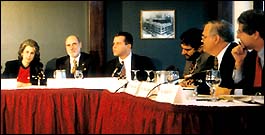
Freedom of Speech at Risk in Cyberspace

| ||
 |
Ernest Lehman, whose screenwriting includes “West Side Story” and “North by North West” stated that, “unless there is change in this trend, whole films could be pirated and put on the Internet without any legal recourse for the owner.” |
National Security at Stake
The problems reach far beyond the private sector. Many break-ins affect national security.
In Toulon, France, a U.S. Naval base maintained computerized records of “submarine signatures”—the unique sounds transmitted by American subs to distinguish them from others, but recognizable only by those who hold this classified information. In October 1995, the computer that stored these was electronically broken into and the information stolen.
At the Pentagon, no less than 250 attempted computerized break-ins occur per day. Freedom found six electronic bulletin board services on the Internet that contained statements that the posters had illicitly obtained classified information from top security sources in the U.S. government.
It was no surprise to read one poster’s statement that “... this is America, and I am free to express myself by sending this information to those who have an interest.”
Confusion and Consequences
A growing number in the private sector have awakened to the need for reforms.
The Center on Speech, Equality and Harm, which operates a site on free speech on the World Wide Web, feels that the concept of “free speech” has been sorely abused, pointing to how laws regulate many categories of expression to prevent harm or to encourage equality. These include speech used to form a criminal conspiracy or to defame or libel, violate a trademark or copyright, or defraud a consumer.
Laura Lederer, Executive Director of the Center, told Freedom, “The issue is, does the speech harm and if it does, what can be done about it?”
She also rejected the idea of an Internet free of the regulations which apply to everyday life. “If the Net is being used for illegal activities, people need to cooperate with the government to eradicate that,” Lederer said. “They’re playing directly into this illegality when they say it should be completely free.”
John Powell, law professor at the University of Minnesota and former legal director of the American Civil Liberties Union, agrees. “There’s a lot of confusion. You can use speech for violence. You can use speech to deny someone freedom of expression,” he told Freedom.
On the Internet, this expresses itself in such concepts as “no one is responsible” and “nobody really owns anything,” which deny accountability for the basic tenets of property ownership and wind up costing American consumers billions each year.
|
Irresponsible Media:
Reckless disregard for free speech
Internet and computer crimes are all over the newspapers and airwaves—except for those crimes committed in the name of “free speech.” No matter how spurious the claim, some reporters and editors buy the rationale—because it fits their own needs and motives.
Unscrupulous media outlets contribute to the problem of subversion of intellectual property when it comes to trade secrets—which the Uniform Trade Secrets Act defines as “information, including a formula, pattern, compilation, program, device, method, technique or process, that: (1) derives independent economic value, actual or potential, from not being generally known to the public or to other persons who can obtain economic value from its disclosure or use; and (2) is the subject of efforts that are reasonable under the circumstances to maintain its secrecy.”
When was the last time the formula for Coca-Cola ran in the morning paper? If it ever were published, the legal thunderclap from a company as powerful as Coca-Cola would be deafening. The right to maintain such secrets is guaranteed under Article I of the Constitution and has been upheld in courts throughout the country.
Yet it seems to be open season on trade secrets,Copyrightsand other proprietary information, which seem to become “fair game” in the media world when it suits the needs of some editors and reporters.
The defense? “Freedom of speech.”
Putting the matter in the context of a secular creation further clarifies the issue:
An individual steals from a songwriter the lyrics to an unpublished song and sends them out on the Internet. When the law catches up to the thief, he defends himself by claiming it is all a case of free speech. The songwriter, in other words, is attempting to “silence” the thief’s First Amendment rights. In reality, the songwriter is seeking to protect his creative work and safeguard his right to determine when and how and to whom it will be distributed.
Courts who fail to act in such cases are making authors, composers, lyricists and directors “fair game” to piracy and rip-offs.
“As much as I approve all advances in technology,” said Ernest Lehman, former President of the Writers Guild of America-West, “I’m scared stiff that very soon anything that is written and anything that is filmed could just be stolen anywhere in the world.”
Lehman, whose screenwriting credits include “The Sound of Music,” “West Side Story,” and “North by North West,” said that “unless there is a change in this trend, whole films could be pirated and put on the Internet without any legal recourse for the owner.”

| ||
 |
Diverse groups have been jointly addressing the issue of free speech and copyright violations and theft on the Internet. A seminal conference on the topic, organized by the Church of Scientology International, involved cyberspace experts and legal pioneers on information issues including Church counsel Helena Kobrin; Vinton Cerf, senior vice president of MCI; Bill Burrington, vice president of America Online; David Post and David Johnson, co-founders of the Cyberspace Law Institure; and Wayne Rash of Communications Week. Solutions emphasize peer pressure from those who live and work in cyberspace, and discourage outside regulation. |
Solutions—Not
Even such empty philosophical inanities as “nobody really owns anything,” and “information wants to be free” breed confusion on the information superhighway. As Winn Schwartau puts it, “The ‘information wants to be free,’ cliche makes a great sound byte, but it really means nothing. Information has no persona. And lots of information can—and does—belong to people.” Free speech is not threatened by copyright law, and neither is the Internet. On the contrary, free speech is threatened by “free theft.” Free speech is abused when it is claimed as a shield to avoid responsibility for unlawful acts.
The solution is to raise ethical standards through peer pressure from those who live and work in cyberspace. The Church of Scientology contributes to this in numerous ways, including sponsoring the Task Force for Responsibility and Freedom on the Internet, and taking part in the recent roundtable entitled “The Internet and Property Rights” which it helped organize. The Task Force broadly distributes a “Netsurfer’s Simple Guide to copyright.”
“If the Internet is to flourish,” said Mark Rost, head of the Silicon Valley chapter of the Task Force, “the creators of the information on our information superhighway must be protected. Intellectual property rights must be respected. If First Amendment rights are used as a justification for violating property rights, the next step will be the loss of some or all of these rights, as government bodies move in.”

